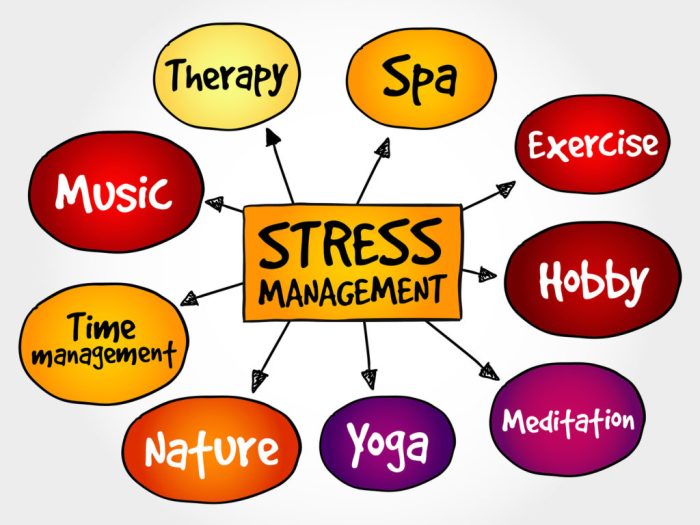Stress management is crucial in today’s fast-paced world, where juggling multiple responsibilities can easily lead to burnout. Dive into the realm of stress management with a high school hip vibe, exploring effective strategies to maintain a healthy balance in life. From relaxation techniques to mindfulness practices, this guide has got you covered.
Introduction to Stress Management

Stress management is the practice of taking steps to control stress levels in order to improve overall well-being. It is important because chronic stress can have a negative impact on both physical and mental health, leading to issues such as high blood pressure, anxiety, and depression.
Impact of Unmanaged Stress
Unmanaged stress can wreak havoc on the body, causing headaches, muscle tension, fatigue, and sleep disturbances. Mentally, it can lead to irritability, difficulty concentrating, and feelings of overwhelm.
Common Stressors in Daily Life
- Work pressure and deadlines
- Relationship problems
- Financial concerns
- Health issues
Strategies for Stress Reduction: Stress Management

In today’s fast-paced world, stress has become a common issue affecting many individuals. It is crucial to implement strategies to manage and reduce stress levels effectively. Here are some effective techniques to help you combat stress:
Relaxation Techniques
- Deep Breathing Exercises: Practice deep breathing to calm your mind and body. Inhale slowly through your nose, hold for a few seconds, and exhale through your mouth. Repeat this several times to reduce stress.
- Meditation: Incorporate meditation into your daily routine to promote relaxation and mindfulness. Find a quiet space, focus on your breathing, and let go of any negative thoughts or tension.
Regular Physical Exercise
Regular physical exercise is not only beneficial for your physical health but also plays a significant role in managing stress. Engaging in activities like running, yoga, or dancing can help release endorphins, also known as “feel-good” hormones, which can improve your mood and reduce stress levels.
Time Management and Prioritization
- Create a To-Do List: Write down your tasks and prioritize them based on urgency and importance. This will help you focus on what needs to be done first, reducing feelings of being overwhelmed.
- Avoid Procrastination: Break down tasks into smaller, manageable chunks and tackle them one at a time. This approach can prevent last-minute stress and help you stay organized.
Healthy Lifestyle Habits
Maintaining a healthy lifestyle is crucial for managing stress effectively. This includes paying attention to nutrition, quality sleep, and social connections.
The Role of Nutrition
Nutrition plays a significant role in stress management. Eating a well-balanced diet rich in fruits, vegetables, whole grains, and lean proteins can help regulate mood and energy levels. Additionally, certain foods like dark chocolate, nuts, and green tea have been shown to reduce stress levels. Remember, a healthy diet is not just important for your physical health but also for your mental well-being.
Importance of Quality Sleep
Quality sleep is essential for coping with stress. Lack of sleep can lead to increased irritability, difficulty concentrating, and heightened stress levels. Aim for 7-9 hours of uninterrupted sleep each night to allow your body and mind to rejuvenate. Create a bedtime routine, avoid screens before bed, and ensure your sleep environment is conducive to restful sleep.
Maintaining Social Connections
Maintaining social connections is another key aspect of stress relief. Spending time with friends and family can provide emotional support, a sense of belonging, and opportunities for relaxation and laughter. Whether it’s through phone calls, video chats, or in-person interactions, prioritize nurturing your relationships. Remember, you’re not alone in dealing with stress, and reaching out to loved ones can make a significant difference in how you manage it.
Mindfulness and Mental Well-being
Mindfulness is the practice of being fully present and aware of your thoughts, feelings, sensations, and surroundings without judgment. It involves focusing on the present moment and accepting it for what it is. When it comes to stress management, mindfulness can help individuals become more aware of their stress triggers and learn how to respond to them in a calmer and more rational manner.
Mindfulness Meditation
Mindfulness meditation is a technique that involves focusing on your breath, bodily sensations, or a specific object to bring your attention to the present moment. By practicing mindfulness meditation regularly, individuals can improve their ability to stay present, reduce rumination, and enhance their overall sense of well-being.
- Focus on your breath: Take slow, deep breaths and pay attention to the sensation of the air entering and leaving your body.
- Body scan meditation: Start from your toes and work your way up, focusing on each part of your body and any sensations you may be experiencing.
- Loving-kindness meditation: Cultivate feelings of compassion and love towards yourself and others by repeating positive affirmations or phrases.
Techniques for Staying Present, Stress management
Practicing mindfulness in everyday activities can help reduce anxiety and improve mental well-being. Here are some techniques for staying present and reducing stress through mindfulness:
- Practice mindful breathing: Take a few minutes to focus on your breath whenever you feel overwhelmed or stressed.
- Engage in mindful walking: Pay attention to each step you take, the sensations in your feet, and the movement of your body.
- Use grounding techniques: Focus on your senses by noticing the sights, sounds, smells, tastes, and textures around you.